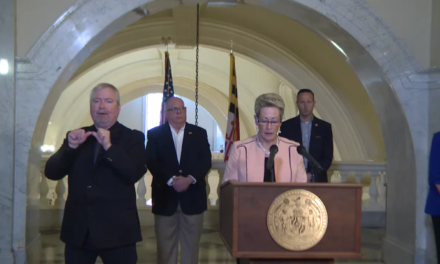By Barbara Pash
For MarylandReporter.com
Speakers from a coalition of health organizations — including the American Cancer Society and the American Heart Association — called for Governor Martin O’Malley to restore tobacco prevention funding that has been reduced over the years with a rally at Lawyer’s Mall in Annapolis on Wednesday.
The state is annually supposed to fund prevention efforts with money from the Cigarette Restitution Fund — where Maryland gets about $155 million each year from a billion-dollar legal settlement with tobacco companies — and from taxes paid on tobacco, said association lobbyist Eric Gally.
In the past two years, health advocates said, the state has cut funding for the programs from $19.6 million to $4.3 million.
Delegate Samuel Rosenberg, a Baltimore City Democrat, vice chair of the House Judiciary Committee and cosponsor of the bill that created the Cigarette Restitution Fund, said money in the fund was earmarked for purposes including Medicaid and smoking cessation and research programs.
However, he said, “given our fiscal situation, a significant portion has gone to Medicaid instead of other, permitted uses” like the smoking programs. “Far less money has been spent on the targeted cigarette-related purposes than we had intended.”
Advocates on Wednesday were fighting for the General Assembly to honor those intentions. Gally cited legislation that specified that at least $6 million needed to be in the fiscal year 2011 and 2012 budget for activities aimed at reducing tobacco use in Maryland. In addition, cancer research grants totaling about $2.4 million were to be distributed in each of those fiscal years to the University of Maryland Medical Group and Johns Hopkins Institutions.
At the rally, about two dozen people heard health advocates describe the impact of the budget cuts on their organization.
Eileen McGrath, senior vice president for government relations in the South Atlantic Division of the American Cancer Society, said that Maryland had the third highest cancer rate in the country in 1990. Now, there are approximately 24,000 new cancer diagnoses per year in Maryland — one of the lowest cancer rates in the country. McGrath attributed the improvement to the free diagnosis and screening programs that funding has allowed.
Peter Fisher, vice president of the Campaign for Tobacco-Free Kids, said that 7,000 people per year die from tobacco use in Maryland, a figure that is below the national rate. However, he said, the funding cuts “put at risk [our educational] programs.”
Fisher added that in a poll taken last month, Marylanders by a more than two-to-one margin supported restoring funds for tobacco cessation.
Roberta Herbst, manager of the Maryland Skin Cancer Prevention Program, said its allocation, usually $100,000 per year, was eliminated in 2009. “There is no program,” said Herbst, who still maintains the organization’s website.
O’Malley spokesman Shaun Adamec said that over the past four years, the governor and General Assembly have approved $5.6 billion in cuts from the budget.
“The Department of Health and Mental Hygiene, in the scheme of agencies, has taken a hit,” Adamec said.
The cuts “have been made with careful consideration not only for the needs of the state but also of the available resources to fund them,” he continued. “The governor has said that as we move through this national recession, as revenues increase and jobs are created and we come through the other side of this tough economy, those cuts will be able to be restored as we are able to.”
However, there is no time frame for doing so, and Adamec said that promising anything without knowing the resources are there would be irresponsible.
Rosenberg said Wednesday’s rally put the prevention budget cuts on the table, and front and center for discussion when the 2011 legislative session begins.
“There will be a debate about our spending, and [the health advocates] want to be part of that conversation,” he said.
Sheila Hixson, a Montgomery County Democrat and chair of the House Ways and Means Committee and sponsor of the tobacco tax bill, echoed the sentiment and said that there will be public hearings about the funds. Members of the coalition can talk about how effective their programs were, and how well the funds were used.
“We want to get that information to the public. This is a prevention program and maybe we can get federal funding,” Hixson said. “We want the Cigarette Restitution on the table.”





Recent Comments